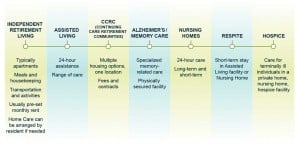When you become a caregiver, there are many things to consider to provide your loved one with the best care; concerns that go beyond just their daily living needs. Usually, by the time you are considering care options, you are most likely behind the 8-ball, i.e. one step behind on the situation. It’s important to admit the need so you get to the right place at the right time. Otherwise it’s always a struggle to get enough care for your loved one.
This is a general overview of the things you need to consider for your aging loved one.
- Assessing Care Need : This will be an on-going issue as your loved one’s needs change. As the caregiver, you’ll need to assess non-medical, medical, and mental needs, from their physical ability to maneuver their current living environment, to the mental ability to care for themselves and stay safe. There are professional sources that can perform an assessment. There is also this Assessment Checklist from AARP.
Also, consider whether it is time to find a gerontologist. They are particularly helpful when dealing with dementia or other age related disease. Also, they are better equipped to deal with medications for the elderly and know which medications that are deadly to seniors. If you don’t choose a gerontologist, at least go to someone with a specialty in elderly patients. They understand age related diseases.
- Care Options: Once you’ve assessed your loved one’s needs, you need to determine how you will serve them. Do you have the resources within the family or will you need to outsource the help? Will you use in-home care? Or will they need to move to a community? There are many options available. Take your time and be creative when considering the options.
-

Senior Living Scenarios, provided by Holiday Touch Deciding the Best Placement: Independent Living, Assisted Living (Group Homes, Adult Foster Care, Traditional Assisted Living), Nursing Home (Skilled Care, Long Term Care), At Home Care, Rehabilitation Care (for temporary recovery situations).
- Finances: What will be the costs? How will they pay for it? What options do they have? Are they eligible for VA Benefits? Will/Can they use Medicare or Medicaid?
- Making the Move: Selling the house? Downsizing. Knowing what you can and can’t bring to your new home. What to do with the rest. (This is an opportunity to give special things to special people. It’s more special while you’re still alive.) What are the most important things to take with you. There are professional organizations that can help with the move and downsizing.
- Family Drama: Be prepared for disagreements, even when you get along. Estate planning can help you avoid conflicts. Health Care Proxy/Power of Attorney, etc.
-

Elements of Estate Planning, provided by
Mackerer LawLegal Issues: Consulting an Elder Law attorney can be beneficial for knowing what documents are important, such as Power of Attorney, Health Proxy, Will, Do Not Resuscitate Order, Estate Planning.
- Resources: As a caregiver, there are a great number of resources available to you. Some will cost, some will be free. A few of these are: Placement specialists, Elder Law Attorneys, State Resource/ County Resources (look for information in their senior section on their website), Area Agency on Aging, Alzheimer’s Association, United Way (for things like wheelchair ramps), Senior Centers (they may have loan closets), and churches, just to name a few.
- Emergencies: How will you handle emergencies? Is your loved one protected in case of an emergency, such as with an emergency alert device? Does the family have a plan on who will respond? This is especially important when living out of town. Did you know that emergency responders will look in the freezer/refrigerator for critical emergency information? (Refrigerator/Freezers are the one thing that doesn’t burn in a house fire.)
- Hospital Stays: It’s a good idea for a caregiver to a plan before, during, and after the hospital stay. You may think because someone is in the hospital they have all the help they need, but nursing staff can’t always respond to a loved one’s needs immediately. Being there to help with some of the little things will make the stay much more comfortable. Try to schedule family support as much as you can.
- Rehab Stays: It’s a good idea for a caregiver to also have a plan for before, during, and after any rehabilitation stays. This includes a checklist for selecting the right rehab facility for your loved one, a packing list for the stay, and what you will need upon returning home.
- Hospice/Palliative Care: What is hospice and/or palliative care? When do you need these services? Hospice is so much more than what it used to be.
- Planning for the End: As difficult as this subject is, it is important to make plans for the end: Funeral Planning and having a WILL: (these are some of the documents that should be stored in the freezer/frig.) If they care about you, they will make these plans to make things easier for you later.
-

StoryCorps – questions that help you document life Other Things to Think About: This is the perfect time for a caregiver to really get to know your loved one. And when you’re spending more time with them, you have an opportunity to record their legacy. There are a variety of sources to draw from to do this. Just a few are: StoryCorps questions, Hospice Legacy Project, and various charities.

